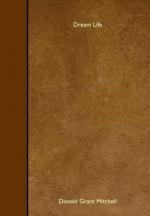The letters of your mother, as I said, make you sigh: there is no moment in our lives when we feel less worthy of the love of others, and less worthy of our own respect, than when we receive evidences of kindness which we know we do not merit,—and when souls are laid bare to us, and we have too much indifference to lay bare our own in return.
“Clarence,”—writes that neglected mother,—“you do not know how much you are in our thoughts, and how often you are the burden of my prayers. Oh, Clarence, I could almost wish that you were still a boy,—still running to me for those little favors which I was only too happy to bestow,—still dependent in some degree on your mother’s love for happiness.
“Perhaps I do you wrong, Clarence, but it does seem from the changing tone of your letters, that you are becoming more and more forgetful of us all; that you are feeling less need of our advice, and—what I feel far more deeply—less need of our affection. Do not, my son, forget the lessons of home. There will come a time, I feel sure, when you will know that those lessons are good. They may not indeed help you in that intellectual strife which soon will engross you; and they may not have fitted you to shine in what are called the brilliant circles of the world, but they are such, Clarence, as make the heart pure and honest and strong!
“You may think me weak to write you thus, as I would have written to my light-hearted boy years ago; indeed I am not strong, but growing every day more feeble.
“Nelly, your sweet sister, is sitting by me. ‘Tell Clarence,’ she says, ‘to come home soon.’ You know, my son, what hearty welcome will greet you; and that, whether here or away, our love and prayers will be with you always; and may God in his infinite mercy keep you from all harm!”
A tear or two—brushed away as soon as they come—is all that youth gives to embalm such treasure of love! A gay laugh, or the challenge of some companion of a day, will sweep away into the night the earnest, regretful, yet happy dreams that rise like incense from the pages of such hallowed affection.
The brusque world too is to be met, with all its hurry and promptitude. Manhood, in our swift American world, is measured too much by forgetfulness of all the sweet bonds which tie the heart to the home of its first attachments. We deaden the glow that nature has kindled, lest it may lighten our hearts into an enchanting flame of weakness. We have not learned to make that flame the beacon of our purposes and the warmer of our strength. We are men too early.
But an experience is approaching Clarence, that will drive his heart home for shelter, like a wounded bird!




